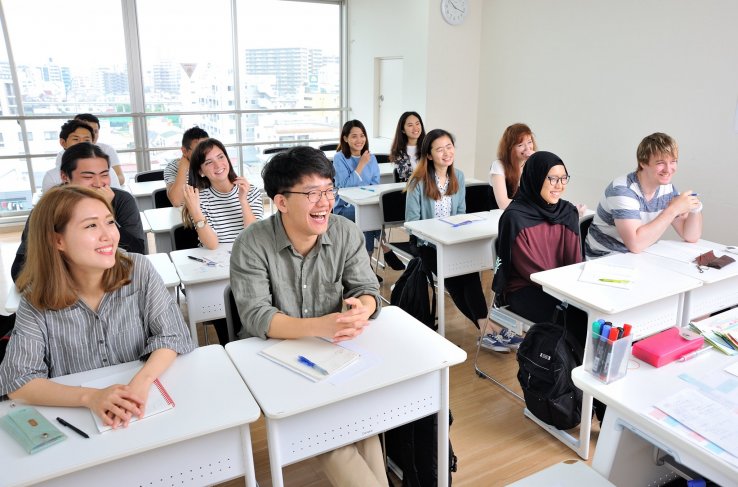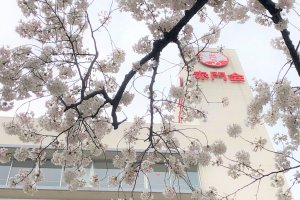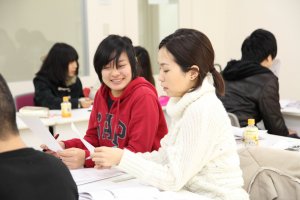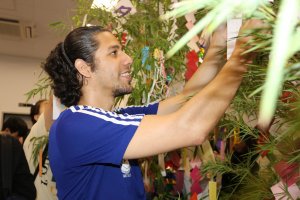The Akamonkai Japanese Language School was established in 1985. To date, they have educated more than 20,000 graduates from over 80 countries. After graduation, students play an active role around the world, including Japan and their home countries. Currently, around 1,800 students from various countries are enrolled in Akamonkai.
Since there is almost always a well-balanced group of international students from roughly 50 countries and regions around the world, the students can communicate in Japanese with fellow students from diverse backgrounds and cultivate a global mindset.

*As of April 2019, student nationalities are composed of 29% Chinese, 21% Vietnamese, 20% South Korean, 15% Western, 10% Taiwanese & Hongkongese, 5% from other countries.
There are 4 school buildings (Main Campus, Nippori Campus, and 2 branch campuses). These are Nippori Station, Nishinippori Station, and Mikawashima Station near school buildings. These stations offer convenient access to the city center of Tokyo. It takes a mere 36 minutes from Nippori Station to Narita International Airport with the express train, Keisei Skyliner.

Within this environment, and in response to new needs, Akamonkai aims to cultivate human resources that can play an active role both in Japan and globally by having every staff member provide students with dedicated support from enrollment till graduation.
Curriculum
Classes are carefully organized according to skill level (with a total of 13 levels), students can study at classes suitable for their Japanese level and learning speed.
Proper mastery of the fundamentals is crucial in order to move on to subsequent learning phases smoothly. As there are many students with different mother tongues and varying degrees of Japanese language proficiency when they first enroll, having classes that cover a range of teaching speeds allows students from a wide variety of backgrounds to efficiently learn Japanese at the pace that best suits them.

For intermediate level students and above, curriculums and classes are organized according to the students' goals (higher education, employment, etc.).
And in these courses, Akamonkai helps students comprehensively expand their proficiency in Japanese, with a proper balance of reading, writing, speaking, and listening.
Courses
They offer a variety of courses to meet the needs of students:
The General Course
This curriculum aims at finding employment in Japan, going on to school, and going back to their home country after graduation. Curriculums and classes are organized according to the students' goals.
Students aiming to obtain a job in Japan can have individual consulting on how to find a job, create a resume, and have a job interview by specialized staff, and receive referrals to companies by Akamonkai's group company.

And, for students aiming to advance to a university or a specialized school, class teachers and specialized staff provide advice suited to each student. In addition to Japanese language classes, students can attend classes for the Examination for Japanese University Admission for International Students (EJU) if they wish.
University Preparatory Curriculum
This curriculum aims at continuing on to school. This course is approved by the Ministry of Education, Culture, Sports, Science, and Technology and allows students with fewer than 12 years of education in their home countries to earn the qualifications to attend Japanese universities. Students can take prep courses for the Examination for Japanese University Admission for International Students free of charge. The Japanese curriculum and career support in this course are equivalent to those in the general course. This course is approved by the Ministry of Education and is approved for only about 20 schools.
Business Employment Class
This curriculum aims at finding high-level employment in Japan. In this class, students will develop high-level Japanese language skills, study business etiquette, and obtain business IT skills.
Akamonkai capitalizes on the strengths of study abroad students, such as their language ability, international viewpoints, and environmental adaptability, and then assists them every step along the way in finding employment at Japanese companies.
Short-term Course (3months) / 3-Week Course
If students can get a visa on their own, or if they come from a country that does not need a visa for a short-term stay, they can take this course. Students in this course study with students in study visa courses and receive the same supports with study visa courses. After they finish this class, they can change to a student visa course if they wish.

Special Short Programs
This course is a short-term program available on-demand. Akamonkai arranges opportunities to experience Japanese culture, go sightseeing, and have cultural exchange with Japanese people as desired in addition to Japanese language classes.

Other support
Dedicated administrative and daily living guidance specialists who can speak proficient languages such as Japanese, English, Chinese, Korean, Vietnamese, etc. are available on-campus at all times.
Akamonkai supports part-time job introductions from their group's recruitment company that take Japanese proficiency levels into account. They also offer support for writing resumes, mock interviews, etc. for a part-time job.
There are about 30 dormitories. Since the dorms are managed directly by the school, they are safe, secure, easy to apply for, and have reasonable rent (35,000 JPY - 60,000 JPY/ monthly). Dormitories are available for any student who wishes to move in.
Akamonkai also has abundant scholarship programs that do not require repayment after graduation. A total of 45 or more students are granted scholarships every year. In order to be eligible to receive scholarships, students must enroll as regular students for six months or more and plan to move on to higher education after graduation.


































